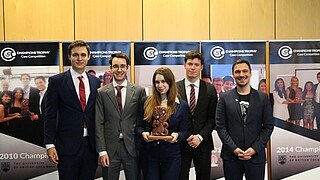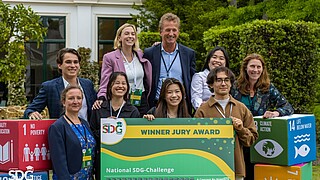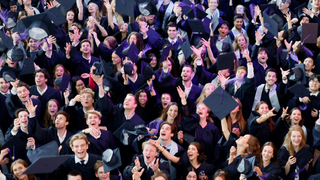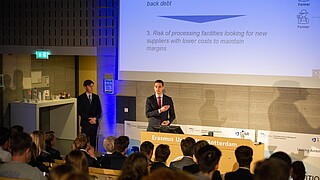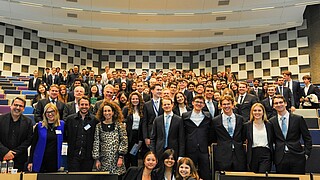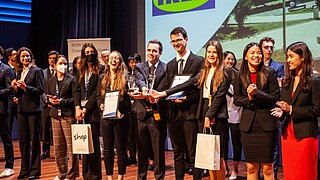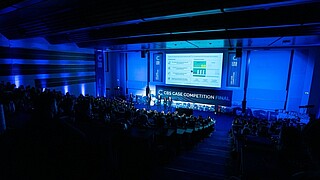Bachelor students Eric Jacob, Nina Ljubanović, Phoebe Nadorp and Lars Schöningh from RSM’s BSc in International Business Administration (IBA) programme competed against 19 other teams from top universities around the world. The 20 teams solved two cases with societal and environmental topics. The 8-hour case was about health clinic BeBetter, which is owned by the Sikarin Bangkok Hospital, and focused on the healthcare and well-being industry in Thailand. The 24-hour case was a case for the Phuket government that asked for proposals to enable Phuket to become net zero by 2040.
The RSM team was placed into a division with Singapore Management University, Maastricht University, St. Gallen University and Concordia University, John Molson School of Business. RSM ultimately won first place for both the 8-hour and the 24-hour case in their division.
In the final, they competed against the winners of the other divisions: University of Auckland, Corvinus University Budapest and Nanyang Technological University. The finals took place in front of a large audience, where RSM came away with first place. Additionally, RSM’s Eric Jacob was awarded with the award for best speaker of the competition.
Complexity, creativity and sustainability
The judges in the final were Tracy Lee (partner McKinsey and Company Singapore), Warot Lilahajiva (head of management consulting at BlueBik) and Dr Oliver Gottschall (COO Betagro Public Limited Company). They unanimously voted for the RSM team, and said that what truly set them apart from the other teams was the structure and approach they took to presenting such an ambitious goal. In addition, the RSM team was applauded for the complexity of their solutions and their fit for the local Phuket context.
“RSM’s curriculum places a much stronger emphasis on sustainability than other universities, so I felt like we had the necessary skills to properly tackle the issues at hand,” said Lars Schöningh. He added that case competitions enable students to create impact by tackling business challenges faced by companies.
Nina Ljubanovic said it also helped to have such diverse team members: “Being able to work in a team with people coming from different countries, we were all able to recall different creative concepts and ideas that our home countries implement. This gave us a strong competitive edge, and of course, makes solving the case even more exciting.”
The competition took place at the Marriott Courtyard in Phuket Old Town. The team solved the cases from their hotel room, and presented in meetings and ballrooms of the hotel. In addition to the competition elements, the business school students joined social activities to network, and enjoyed an ethical elephant retreat and Surin Beach in Phuket.
RSM STAR Case Club
The RSM-STAR Case Club solves real-life business cases that are written by company professionals and focus on a problem that an organisation is facing. Topics range from finance to corporate social responsibility (CSR), and from marketing to digital innovation. Cases are typically solved in teams of about four students, in a timeframe ranging from 3 to 48 hours, and are presented to and judged by a panel of academic staff, consultants and industry professionals. RSM STAR host trainings, workshops and case days throughout the year. In addition to joining prestigious international competitions, it also organises our annual RSM STAR Case Competition in Rotterdam.

